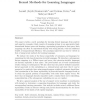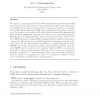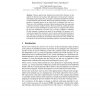141 search results - page 17 / 29 » An Algorithm for Transformation of Finite Automata to Regula... |
TCS
2008
13 years 8 months ago
2008
This paper studies a novel paradigm for learning formal languages from positive and negative examples which consists of mapping strings to an appropriate highdimensional feature s...
CORR
2007
Springer
13 years 8 months ago
2007
Springer
We propose a computing model, the Two-Way Optical Interference Automata (2OIA), that makes use of the phenomenon of optical interference. We introduce this model to investigate th...
CPAIOR
2009
Springer
14 years 3 months ago
2009
Springer
An attractive mechanism to specify global constraints in rostering and other domains is via formal languages. For instance, the REGULAR and GRAMMAR constraints specify constraints ...
ATVA
2006
Springer
14 years 10 days ago
2006
Springer
Whereas partial order methods have proved their efficiency for the analysis of discrete-event systems, their application to timed systems remains a challenging research topic. Here...
CUZA
2010
13 years 6 months ago
2010
In this paper, we describe a symbolic synthesis method which given an algebraic expression that specifies a bitstream function f, constructs a (minimal) Mealy machine that realise...



